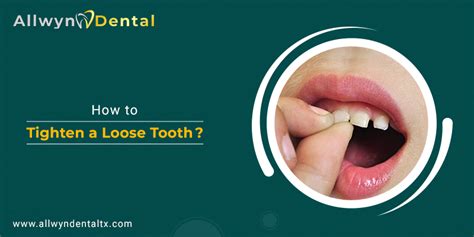How to Tighten a Loose Tooth: Proven Techniques
A loose tooth, especially in a child, can be a source of anxiety. While most loose teeth are simply part of the natural process of baby teeth falling out, a loose adult tooth requires immediate attention from a dentist. This article explores proven techniques for dealing with a loose tooth, focusing on both children and adults. Remember, this information is for guidance only, and professional dental advice is crucial for proper diagnosis and treatment.
Why Do Teeth Become Loose?
Understanding the reasons behind a loose tooth is the first step in addressing the problem. Several factors can contribute to tooth looseness:
-
Normal Exfoliation (Children): As a child's permanent teeth develop, their roots absorb the roots of the baby teeth, causing them to loosen and eventually fall out. This is a natural process and usually doesn't require intervention.
-
Gum Disease (Adults): Gingivitis and periodontitis, forms of gum disease, are leading causes of tooth loss. Infection and inflammation destroy the tissues supporting the teeth, leading to looseness.
-
Trauma (Both Children & Adults): A blow to the mouth or a significant impact can damage the tooth's supporting structures, causing it to become loose.
-
Bruxism (Adults): Grinding or clenching teeth (bruxism) can put excessive pressure on the teeth and their supporting structures, eventually leading to looseness.
-
Bone Loss (Adults): Age-related bone loss, certain medical conditions, and inadequate nutrition can weaken the jawbone, leading to less support for the teeth.
-
Poor Oral Hygiene (Both Children & Adults): Neglecting proper brushing and flossing allows plaque and tartar to build up, increasing the risk of gum disease and tooth loss.
How to Tighten a Loose Baby Tooth (For Children):
There's no proven method to "tighten" a loose baby tooth that's naturally falling out. The process is a natural part of development. However, you can take these steps to ensure comfort and prevent complications:
- Gentle Cleaning: Maintain good oral hygiene by brushing gently twice a day with a soft-bristled brush and fluoride toothpaste.
- Avoid Pulling: Resist the urge to pull or wiggle the tooth excessively. This could damage the gums or surrounding teeth.
- Soft Foods: Offer soft foods that require minimal chewing to reduce discomfort.
- Monitor for Infection: If the area becomes swollen, painful, or shows signs of infection (redness, pus), consult a dentist immediately.
What About a Loose Adult Tooth?
A loose adult tooth is a serious matter and requires immediate professional dental attention. Do not attempt to "tighten" a loose adult tooth at home. This can cause further damage. Instead, schedule an appointment with your dentist as soon as possible.
What Should I Do if I Have a Loose Adult Tooth?
This is a crucial question. A loose adult tooth requires immediate professional attention, here's why:
- Underlying Issues: A loose adult tooth is a symptom of an underlying problem, such as gum disease, trauma, or bone loss. A dentist will need to diagnose and treat the root cause.
- Treatment Options: The appropriate treatment will depend on the cause of the looseness and the extent of the damage. Options can range from deep cleaning and gum therapy to splinting the tooth or, in severe cases, extraction.
- Preventing Further Damage: Delaying treatment can lead to further tooth loss and potential complications.
Can a Loose Tooth Be Saved?
The possibility of saving a loose adult tooth depends heavily on the underlying cause and the extent of the damage. Early diagnosis and intervention are crucial for maximizing the chances of success. Your dentist will assess the situation and determine the best course of action.
How Can I Prevent Loose Teeth?
Practicing good oral hygiene is the cornerstone of preventing loose teeth. This includes:
- Brushing Twice Daily: Use a soft-bristled toothbrush and fluoride toothpaste.
- Flossing Daily: Remove food particles and plaque from between the teeth.
- Regular Dental Checkups: Visit your dentist for professional cleanings and examinations at least twice a year.
- Healthy Diet: A balanced diet contributes to overall oral health.
- Mouthguard (if applicable): Wear a mouthguard if you grind your teeth or participate in contact sports.
This comprehensive guide addresses common concerns about loose teeth. Remember, seeking professional dental care is essential for any concerns regarding a loose adult tooth. For children experiencing the natural loosening of baby teeth, gentle care and monitoring are sufficient. Maintaining good oral hygiene habits throughout life is crucial for preserving your oral health.

